Displaying items by tag: Tom MacSweeney
ISAF Becomes 'World Sailing' – What's In A Name?
The world sailing organisation has changed its name – and about time too!
The initials, ISAF, had to be explained in the English language as – International Sailing Federation.
Having to explain an organisation’s name does it no favours.
The name was not sufficiently descriptive, it was cumbersome, bureaucratic-sounding and a hang-over from the past when sailing was the preserve of too many elite factions.
Changing to ‘World Sailing’ is more correctly descriptive of the sport.
This was announced at the World Yacht Racing Forum in Geneva, where 280 delegates discussed the future of the sport, how to increase the level of public awareness of sailing, increase active participation, ensure sustainability, deal with emerging safety issues such as foiling and how to build the commercial appeal of sailing to increase sponsorship.
One of the particularly interesting discussions, I felt, was about the training of young sailors and how the sport can ensure their continuance in what we like to regard as “a sport for life.”
There is on-going discussion in the sport here about the level of coaching of younger sailors and whether the Irish Sailing Association, the national governing body, puts too much emphasis on the ‘Pathway’ to competitive international sailing and not enough on clubs and domestic competition.
It has been argued that this discourages junior sailors from long-term participation in the sport and is a counterbalance to the concept of sailing as “a sport for life.”
The approach to junior sailing was discussed at the World Yacht Racing Forum where Andrew Hurst, Editor of Seahorse, the international sailing magazine, said that young sailors were being “absurdly over-coached.” As an example, he said: “We have very few Optimist champions who have gone on to win silverware at senior level. We need to inspire youngsters to look at sailing as a sport for life.”
That remark arguably challenges the Optimist fleet, which introduces the youngest participants to the sport. While the training provided to Optimists gives youngsters a good grounding in the sport and builds their confidence, I have been told by several parents of their concern that this can be over-done and can place too much emphasis on competition.
But I have also seen at first-hand – and admired - the commitment of parents to the organisation of events such as the Optimist Spring Training Weeks held at Baltimore in West Cork, where I saw the benefits of good coaching to the young sailors taking part. They seemed to me to gain confidence and ability in boat-handling, but if they are not destined to become potential ‘winners’ will they drop out of sailing in later years?
Interestingly, the winning skipper of the Volvo Ocean Race, Ian Walker, said at the Geneva meeting that in some developed nations “kids are being over-coached to the point where they want to leave the sport in their late teens, never to return.”
This is an issue which needs more analysis and discussion because many clubs are concerned about membership levels right now and into the future. The continued involvement of young people is vital for the future of the sport.
One of the disappointing aspects of the Geneva meeting, in my view, is that there is no sign yet of World Sailing achieving any change of the polluted Rio waters for Olympic racing next year, nor of getting sailing back into the Paralympics. After next year, disabled sailing has been dropped and that to me is an appalling vista for the future of our sport.
Remembering Lives Lost At Sea
I met a man this week who wants to make St.Stephen’s Day a national day of remembrance for those who have died in tragedies at sea.
There has never before been such a day in Ireland.
Noel McDonagh is from Dunmore East in County Waterford, one of the top fishing ports in the country where he spent many years of his life fishing.
He is the man who founded LAST – the charity called ‘Lost At Sea Tragedies’ – which has helped with financial aid to the families of fishermen who have lost members of their family in tragedies at sea.
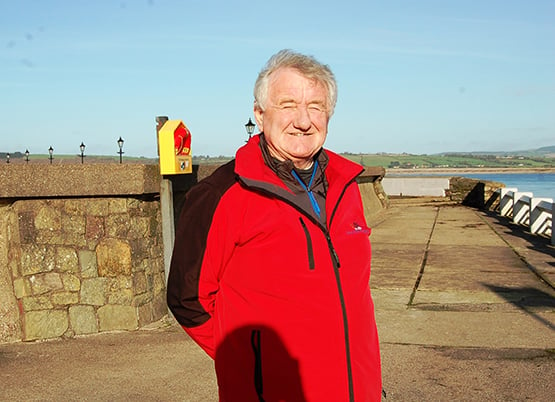 Noel McDonagh
Noel McDonagh
“I have seen many tragedies, friends, relatives lost at sea, something had to be done and I felt I would do it,” Noel tells me on the current edition of my THIS ISLAND NATION radio programme which you can hear here. I have done many interviews in my career on radio and television. This will stand out in my memory. Noel is dedicated to this cause in which he believes. Now retired, having been involved in the outdoor sports equipment business after fishing, when I met him he was delivering special candles made for LAST to shops for sale at Christmastime, to raise funds for the charity.
After the tragedy when the three Bolger brothers – Paul, Kenny and Shane - drowned while fishing on the Waterford coast in June of 2013, Noel was part of the group which organised and launched a CD called “Songs for the River Men.” Many artistes - from Ireland, the UK, USA, New Zealand, Australia, Canada and Newfoundland - contributed their work, to raise funds for the family.
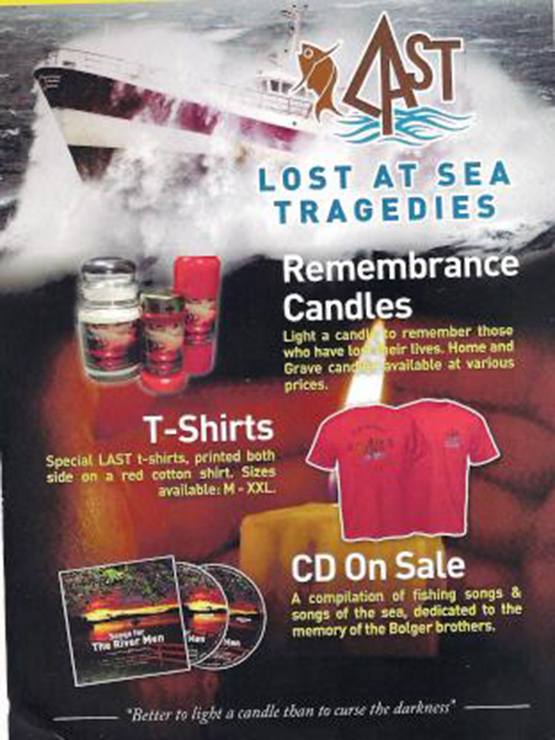
Several coastal communities have arranged remembrance events for St.Stephen’s Day. “We are leaving it to communities to make their own arrangements. The remembrance will be for fishermen and all who have lost their lives at sea. Ireland should remember them and St.Stephen’s Day at Christmastime is a time to think of them and their families,” Noel said.
As well as helping families with financial aid when it is needed after a tragedy, LAST intends to “assist and educate the Irish fishing industry to help prevent future catastrophes while offering support and guidance to the families of those lost in fishing tragedies.”
“When there is a tragedy there is interest for a few weeks, amongst the media, the public, the State and then the tragedy can get forgotten. But LAST will not forget. Our aim is to create awareness about tragedies, the effects on families, on communities and how they should be avoided,” Noel McDonagh says. “LAST will achieve its aims by informing and influencing the Irish fishing industry, coastal communities, businesses, Governmental and non-governmental organisations in and around Ireland.”
Do please listen to his interview and also to Niamh Stephenson, Public Relations Manager with the RNLI, who recalls that last year, there were 100 call-outs of the lifeboats between Christmas and the New Year when 67 lives were saved. CEO of Irish Water Safety, John Leech, tells us about the national wards to those who have contributed to water safety and there is a beautiful story from Rhoda Twombly, Secretary of Comhdháil Oileán na hÉireann – the Islands’ Federation – about the difficulties of getting home to an offshore island with the Christmas supplies in bad weather.
On the programme I am also told how school pupils cleared 12 tonnes of rubbish from a beach wetlands area in East Cork where over 11,000 birds have been recorded. That debris included an entire camping tent, containing clothing, which had been buried on the beach.
As their teacher says: “Nothing about the way people disregard the importance of protecting our marine areas surprises me any longer!”
We Can't Breathe Without The Sea
The dominant subject in the past week has been the weather – pictures on television and in the newspapers of water pouring through streets, into houses, shops, stranded cars and so on – bringing in its wake flooding, destruction, tragedy in its effects on people’s lives. I have heard from seafarers who faced appalling conditions at sea - winds gusting from 50 miles an hour, up to 100, accompanied by massive seas, huge waves. Nightly on television the weather maps have shown where it was all coming from – across the oceans – spinning over the Atlantic, moving in the jet stream, lashing the first land mass it encountered, THIS ISLAND NATION…..
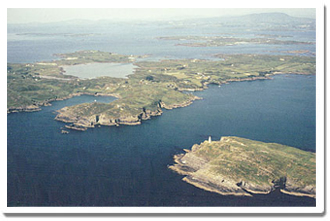 Sherkin Island in West Cork
Sherkin Island in West Cork
Nature does show us humans at times just how little we can control her moods and what can be unleashed upon us and I wonder if people fully realise the importance of the oceans.
Matt Murphy lives on one of our offshore islands which felt the first lash of the gales in the past week. That’s Sherkin Island off Baltimore in West Cork where he founded and has run the Sherkin Marine Station for 40 years and was an early exponent of the need to be aware of climate change:
Matt outlined his views to me in an interview which you can hear on the audio Podcast of THIS ISLAND NATION above.
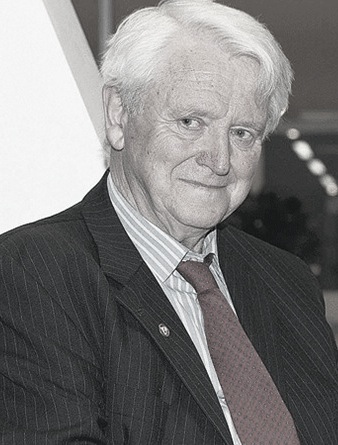 Matt Murphy
Matt Murphy
I attended a seminar in Dublin a fortnight ago as part of the Sea for Society programme, which is an extensive European Commission project, promoting the opportunities in the seas, but also warning about the threats to them from human behaviour. The seas, the oceans are a marvellous place, so vital to our human welfare, but at the seminar I wondered if those of us who are aware of the maritime importance in life are talking to ourselves and that the message may not be getting through to the public at large. Have you ever listened, really listened, to the sounds of the ocean?
It is worth listening to these unusual sounds, which you can hear on the Podcast. For example, have you ever heard the sound a haddock makes?
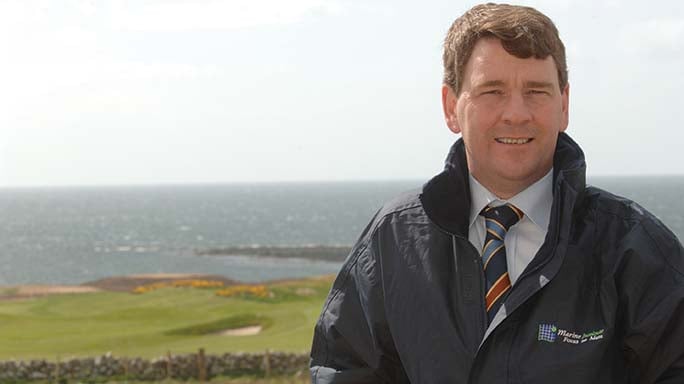 Dr. Peter Heffernan
Dr. Peter Heffernan
Those sounds should, surely, make one think about life in the oceans and men like Dr.Peter Heffernan do. He is Chief Executive of the Marine Institute which carried out a seabed survey between Newfoundland and Ireland in the past year.
He summarised for me the importance of the oceans:
You can hear Peter Heffernan outline in the Podcast why “every time we breathe… we need the sea….”
Indeed we do …. Let’s remember that…….
Memories of The Round Ireland Yacht Race
The first time I sailed the Round Ireland Yacht Race was in 1986 aboard Philips Innovator.
That was a time when maxi yachts were not a feature of Irish waters. Innovator had sailed the Whitbread Round the World Race and was big news when she arrived in Ireland, having finished second in the Whitbread. I was one of the media members offered the opportunity to crew and jumped at the chance. There were Dutch professionals in charge, led by Skipper Dirk Nauta and amongst my memories are counting 33 tacks in an hour as the yacht fought the tides around Rathlin. And towards the end of the race his decision to tack in the Irish Sea and head unerringly for the finish line in a time of 100 hours, 50 minutes and 59 seconds.
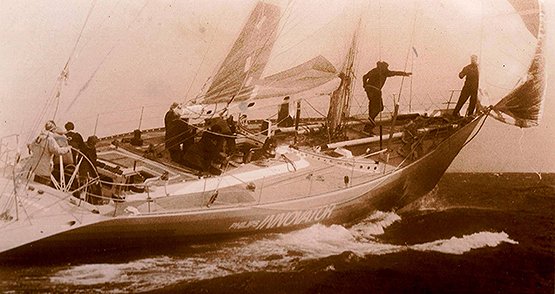
Philips Innovator battles her way around Rathlin in the 1986 Round Ireland race, with me on the grinder starboard side
That was my first experience of working a deck grinder and around Rathlin that instrument became an item to which I took a particular dislike… But that’s sailing on big boats and she was big by Irish standards then, though not now. She was a Baltic 55, built in Finland and in later years became a charter boat called Outlaw in the Caribbean. I met up with her again in Fort Lauderdale when she was named Equity & Law in the 1990-91 Round the World Race when I joined the crew of NCB Ireland in the final leg of that race across the Atlantic.
In 1992 I sailed in the Round Ireland race once again, this time aboard Mayhem out of Galway Bay Sailing Club, a 44-footer, owned and skippered by John Killeen. For her size she had a tiller and that was demanding and unusual. Particularly demanding on some heavy nights along the western coast, when one of my memories is lying in my bunk off-watch listening to the cheery voice of the Tribesmen crew as they pirouetted the boat on top of another wave and cheered loudly as the yacht took off under spinnaker.
I was to do the race, which has many happy sailing memories for me, one more time but after that my involvement was reporting it, with memories of chasing the fleet in a Wicklow Club boat from the start line, rushing back with pictures and then driving back to Donnybrook to edit the pictures at Montrose and get them onto TV News. In later years the arrival of satellite vans made life much easier.
I have memories of seeing beautiful sunrises around the top of Ireland, magnificent sunsets, conditions which varied from flat seas to pounding waves and worried nights in darkness trying to keep clear of the coastline as lighthouses winked their warnings and huge waves and high winds tried to push us ever inwards where we feared becoming ‘bayed’ and fought for open water.
There were great names and people to interview – Michael Jones who started Wicklow Sailing Club’s great idea to hold the race; Dennis Noonan who sat in his eyrie, the Race Office built alongside the club house and, with an easy grace, controlled matters. The relief of getting ashore at the end of the race to the hospitality in the club, contrasted with the always-present even if never-admitted, bit of pre-race nerves before the start.
Interviewing people like the legendary Denis Doyle on Moonduster of the RCYC, only achieved after lots of persuasive effort and hearing his wife Mary tell him how soon she expected this legendary boat and then race speed record holder to be back in Wicklow and how many days she had provisioned the yacht for. One of her comments gave me the title for one of my television race documentaries, when she said that the crew would be using the Fray Bentos tins of steak and kidney pie if they were not back in four days. I called the documentary – Four Days or the Iron Rations – and Mary laughed about that.
There were yachts with names that stood out – Commanche Raider sailed by Norbert and Patrick Reilly, Jim Donegan’s White Rooster from Cork; the maxi Drum, named Mazda Drum for the race and other international boat names – Rothmans, Creighton’s naturally and Colm Barrington with the W60 named Jeep Cherokee which set a record of 76 hours 23 minutes and 57 seconds making the story of the race in 1998.
I broadcast radio programmes from the club house on the eve of the race start, sat on the rooftop lounge drinking nightcaps with club members and harbour staff and once was given the honour of doing the public address race start commentary. Great memories and so many other names and personalities flooded through my mind when Peter Shearer, the current Chairman of Wicklow’s Race Committee announced that next year, for the first time, there will be a separate multihull class.
That, I thought, is an example of how Wicklow has retained its dominance of the race, despite several attempts over the years by bigger clubs to wrest it to their locale.
It will add a new international dimension and should bring more excitement to the event which is a staple of the Irish offshore scene. Over the years they have established links with the Royal Ocean Racing Club and next June will host it jointly, as they did two years ago, with the Royal Irish Yacht Club of Dun Laoghaire. Spreading their wings and involving more people rather than maintaining an exclusive solo run, so that the race continues to be a Wicklow event is important so that clubs in locations that are not major centres, show what they can contribute to the sport.
There will be a new trophy for the multihulls and another new one for the best sailing school boat, as the race is popular with sailing schools.
Already Team Concise has pledged its three multihulls and Rambler 88 from the US, a sophisticated racing machine is committed to take part.
For me it is a long way from Philips Innovator and Mayhem, but it is the evolution of a special, iconic Irish race.
If you haven’t done it, try it.
The start line on the eighteenth of June at 2pm for the 19th running of the race should be a great place.
Ocean Discovery Reveals Life in The Sea Predates Dinosaurs
There is always something unusual in the sea, a phrase I have heard very often from marine scientists and which I have been known to utter myself. It comes to my mind time and again when I am preparing this fortnightly radio programme.
From somewhere in my educational background, most likely with the Presentation Brothers in Cork aeons ago, I became conditioned to believe in a world that was, seemingly, manufactured within a defined religious-approved period, but I did not conceive then as a youngster that this could have happened many, many millions of years back, before the period recognised by the Brothers who taught me a lot that I value today, but were less informative about the millions of years BC.
So, when I come across information about a new discovery in the ocean, dating back many millions of years ago, the dating of them still comes as a surprise to me. Perhaps that is reflective of my age, or rather maturity, which I prefer to regard it as – maturing … like a good wine!
Anyway, that phrase came back to me when collating the News review for the current edition of THIS ISLAND NATION and two stories which came from North America about discoveries going back those ‘millions of years ago’. They reported that sharks existed on Earth 300 million years ago and that was before the age of the Dinosaurs. The discoveries have been made by marine scientists in Texas and New Mexico. The fossil of a shark more than 8 metres long - that’s about 26 feet - and a quarter longer than the modern great white shark – has been found in Jacksboro, Texas, on what was the seabed of the Western Interior Seaway which covered Texas in water 300 million years ago. In addition to that, a nearly-complete fossilised shark that also dates to about 300 million years ago has been found during an archaeological dig in a quarry in New Mexico. A female specimen, this measures 6 feet, that’s around 2 metres, long.
It all shows that we still know less about the seas than we do about the Universe – and that’s something else which scientists say quite often!
Double Volvo Ocean Race Winner Justin Slattery – More Boxes to Tick
I have known Justin Slattery and followed his career for many years as he rose to become one of the top international sailing stars, the winner now of two Volvo Ocean Races in the toughest position on a racing boat, that of Bowman.
Justin is a very pleasant, courteous, friendly and quiet man, who can take justifiable pride in what he has achieved, but whose international reputation as a top sportsman, a top athlete, would not be as well-known in Ireland as the names of unpronounceable English soccer players and that, in my belief, is an indication of the failure of sports coverage in the general national media to give sailing and its Irish stars their rightful place..
In sailing, his name is at the top internationally and he does not forget his Irish background. He is back in Cork for a rest after an exceptionally busy racing period. It is the first time he has taken a break since the end of the Volvo Race in Gothenburg in June, the second time he won it, this time aboard Abu Dhabi. He was sailing again with British Skipper Ian Walker, with whom he had also sailed aboard the Irish entry, Green Dragon, in the 2008/2009 Volvo Race.
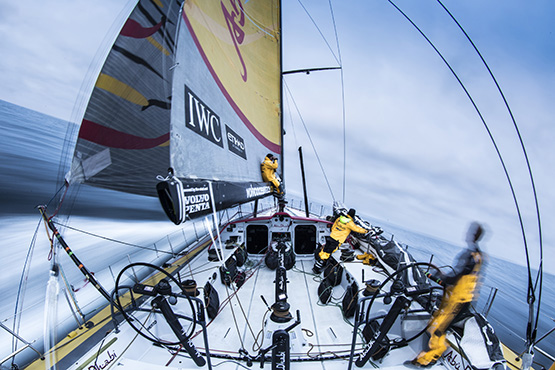
Abu Dhabi at speed in the Volvo Race Photo:Matt Knighton
In my interview with him, he discusses that project and the need to have sufficient backing and support in a Volvo campaign.
“You are up against the best in the world in the Volvo Race, with the best resources. If you arrive on the start line under-resourced or with a boat that’s off the pace, then you are on the back foot right away and that is a pretty painful way to go around the world.”
A clear, definitive assessment there from a sailor who has huge international respect and experience and who also won the 2005-2006 Volvo Race aboard ABN AMRO ONE.
“I have managed to tick a lot of boxes over the last few years, but it seems that those boxes are ever-increasing. There are various types of racing I would like to do, boats I would like to race. There is never a dull moment and I am looking forward to the future,” he told me as we discussed his sailing career and his plans for the future in the interview for this Podcast.
Now aged 41 Justin lives in the UK sailing centre of the Hamble and was back in Cork for a rest and relaxation with his wife and daughter, before again entering the racing circuit next year when the Caribbean season starts.
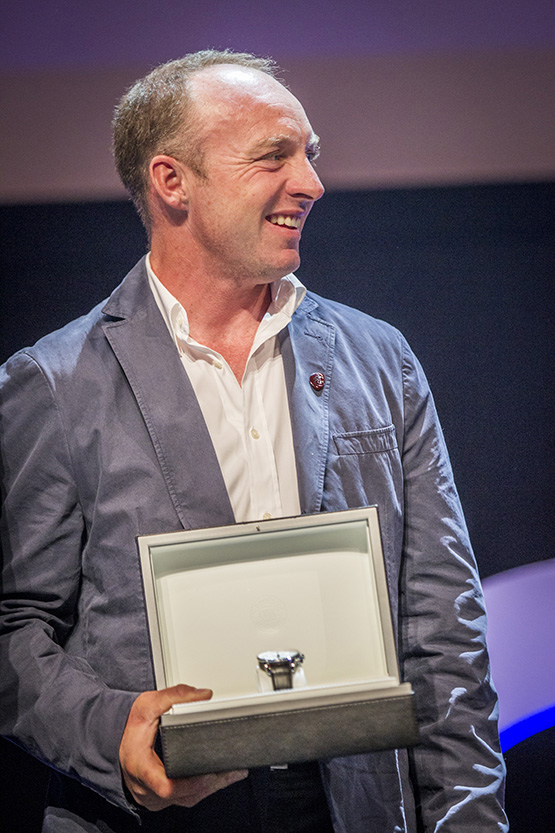
Justin Slattery at the Volvo Race Awards Ceremony in Gothenburg
CLICK the podcast at the top of this blog to listen to the interview.
One of my prized sailing possessions is a cap which Justin gave me after he won his first Volvo Race and which he had worn aboard AN AMRO ONE.. There is a story to it. When my boat was broken into and damaged on its mooring at Crosshaven a few years ago, that hat was amongst the items stolen. An alert Garda detective spotted a man wearing it in Cobh and, with sailing knowledge, questioned him as to where he got it. That led to an outcome where quite a bit of stolen boating equipment was found, including some of mine and Justin’s hat, which was returned to me and which I still use, as the photo shows!
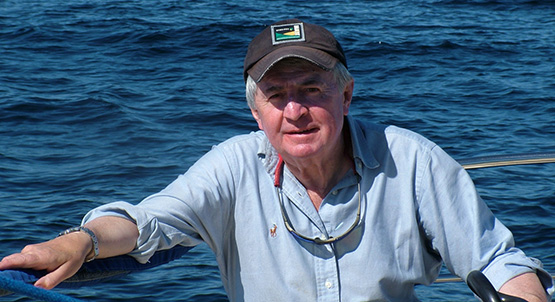
The hat that survived thieves
“The Slower You Travel, The More You See….”
It is a point which I feel compelled to make, time and again, because it is people who make up a community of interest, by their determination, their commitment, their focus and that is what I believe the marine community to be and so, consider it to be THE FAMILY OF THE SEA, a common interest which those of us who value the sea, the lakes and the rivers of Ireland share. Long may there be such people.
I am fortunate enough to come across them, to hear their stories and to be able, through this medium, to bring them to the attention of others. This week on the programme, a 22-year-old is the focus. There are people who decide to do amazing things, for no motivation other than that they want to achieve something and to help a particular project. Twenty-two-year-old Alex Ellis-Roswell is one such person. He comes from Margate in Kent in England from where he started walking around the coast of Britain and Ireland in August of last year, planning to take two years to complete his self-imposed task and raise money for the RNLI lifeboat service as he walked.
”The slower you travel, the more you see…” is his attitude … But can you imagine getting into a sleeping back somewhere at six o’clock on a Winter’s evening to spend the night outdoors? That was one of the things he describes on the programme as he outlines how he chose the pathways for his journey. But he also records the most horrible sight which he has seen and this is something to which I have referred before – human abuse of our beaches, our foreshore areas.
Alex has had to take a rest from his walk for a while, to recover from damage to his knees during his expedition, but he plans to resume shortly. He is a fascinating, determined young man on a mission, who set himself a target of raising stg£10,000, which he is set to exceed, such has been the level of popular support he has been receiving.
For more information about his journey go here
WI-FI ON DUBLIN BAY
Also on the programme you can hear about the introduction of Wi-Fi on Dublin Bay and the Dublin Bay Digital Diamond, which Deirdre Lane, Navigation Policy Officer with the Commissioners of Irish Lights, describes. Click the link at the top of this story to listen in.
SOMETHING UNUSUAL
There is always something unusual to be found in the sea and we come across such stories and incidents regularly when compiling THIS ISLAND NATION. This week we report that Live Science website has issued pictures of a rare and endangered sea turtle which was found near the Solomon Islands.
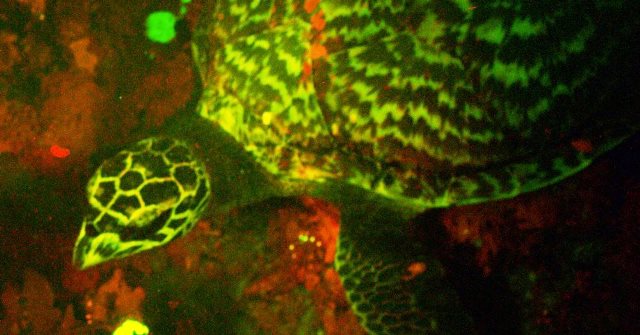
It was spotted underwater by divers at night time, glowing bright red and green and they filmed it – identifying it as a hawksbill sea turtle. "It was a short encounter," said David Gruber, an Associate Professor of Biology at Baruch College in New York City and a National Geographic explorer. “It bumped into us and I stayed with it for a few minutes. It was really calm and let me film it. Then it dived down the side of a cliff face wall."
GOING FOR A PINT IN A BATHTUB
There is a lot of tide in the Shannon Estuary, which can make it a dangerous place in certain conditions, so it is hard to imagine that anyone would try to use what seemed liked nothing bigger than a bathtub to set out on the river to go for a few pints. Not surprisingly those involved got into trouble and Kilrush Lifeboat was called to their rescue. This story is told on the programme by Pauline Dunleavy of the West Clare lifeboat station.
• With the latest angling news from Myles Kelly of Fisheries Ireland and other stories there is, as always, a lot worth listening to on THIS ISLAND NATION. Click the link at the top of this story to listen in.
Tom MacSweeney
Have You Told Your Boat You Love Her?
I feel an empathy with Jimmy Buffett, the American singer and songwriter, whose words about his boat resonates with me:
“Yes, I own a boat… It slides across the sea… Some folks say I’m a part of it…I know it’s part of me…”
Do you feel that your boat is part of you?
Have you ever, in the boatyard during winter lay-up, when you visited your boat – as you should to check on her – caressed her hull and did it give you a loving feeling towards her and, as you left… Did you remind her that “the season isn’t too far off…”
Or, after she has been launched, on the mooring or at the marina, as you slid open the saloon hatch and stepped below, did you tell her you were glad to be back….?
“If a man must be obsessed by something, I suppose a boat is as good as anything… Perhaps a bit better than most…”
Now there’s a good reason for owning a boat!!! It was penned by the writer E B White of New Yorker magazine and many other journals, a leading American essayist whose son. Joel, was a noted naval architect known for beautiful, classic designs, including the famous W Boats.... E B said that a sailing craft was “not only beautiful, but “seductive and full of strange promise and the hint of trouble…”
Little wonder then, that they are referred to as ‘she’…..
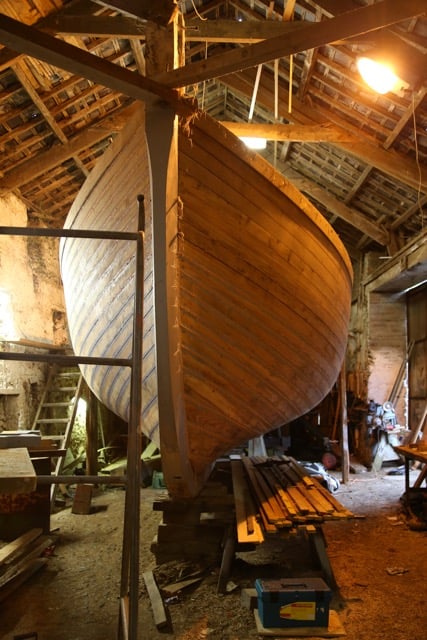
Impressive restoration of the Ilen
In my work as a marine journalist, I am lucky enough to meet people who love boats… I remember being down at Liam Hegarty’s boatyard at Old Court near Skibbereen in West Cork, where they still work the traditional crafts of the shipwrights and where, with Gary McMahon from the Ilen School and Network for Wooden Boat Building in Limerick and all their supporters there was a magnificent, great feeling of warmth about the restoration of the Ilen, Ireland’s last surviving, largest, original wooden sailing ship.
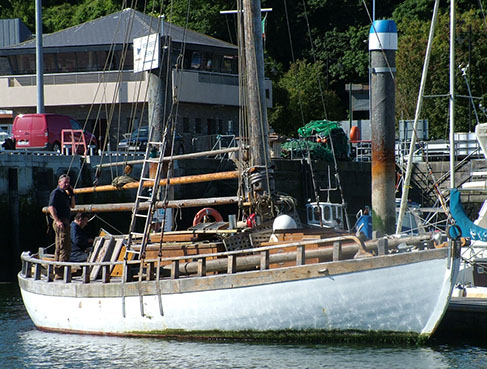
Colm Newport's Colin Archer design at Kinsale
During the Summer I met Colm Newport, who was Master of ASGARD II and who told me about his restoration of a lovely old Colin Archer boat of Norwegian extraction which he is restoring. A “beauty in wood” as she was described…. And there are many others who love their boats, so back to the point at issue – Do you love your boat and are you prepared to admit to it in public…..?
I do and have, though getting odd looks from time-to-time and questions such as how can you love an inanimate object….? But then, is a boat an ‘inanimate object’ or does it have a life of its own? Thereby hangs another debate… Why is the old adage, for example, often honoured – that to change the name of a boat may be unlucky?
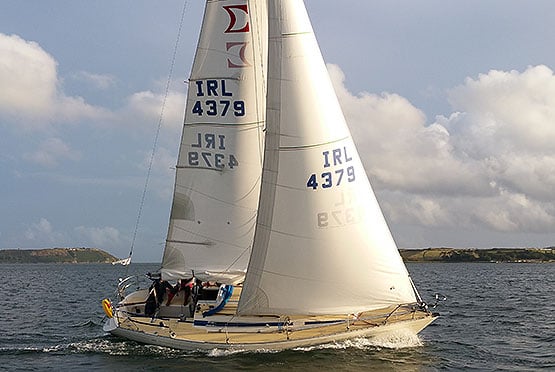
My special female - scribbler - my Sigma 33 racing at the RCYC in Cork harbour
I have changed the name of every boat I have owned…… And my present Sigma 33, which I do love, was named ‘Sarabande’ when I bought her, which I changed to SEASCAPES as I was presenting the programme on RTE at the time, but having left there I saw no reason to give RTE free publicity, so I have changed her name this season to SCRIBBLER… Rather appropriate I think …
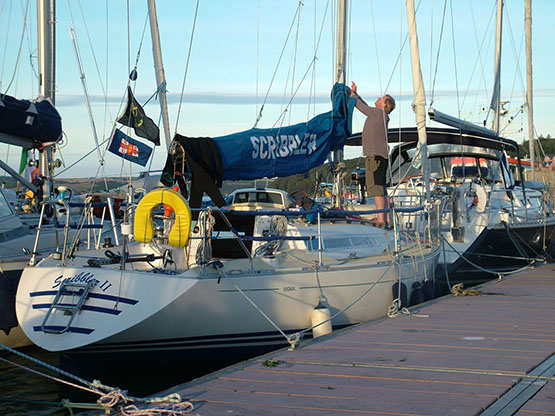
Scribbler at Courtmacsherry cruising in West Cork this summer
I had a lot of work done on her at the yard this year.. On the evening before launching at Castlepoint Boatyard in Crosshaven, I visited to check all was in order and caressed her refurbished hull, with its new markings and paintwork, which have led several people to think I had a new boat…. , then told her I would see her afloat in the morning … And when I went aboard at the mooring for the first time…. sliding back the hatch.. told her it was good to be back…
She looks after me, so I look after her….. Sometimes I do wonder about my state of mind and of health, for I have been told that it is not a good sign to be talking to a piece of plastic…. But I don’t see her as that.....
In the Merchant of Venice, William Shakespeare wrote that “ships are but boards, sailors are but men….” But then what did he know about putting men and boats, either of wood or plastic together and what that can lead to?
There’s something about a boat …. No matter how many times its bow kisses the waves….. or pushes her way through them … you always want more…” Friendship is a boat that never sinks….
This year I have met men and women who also love their boats, respect, help and nurture them......It is small wonder that we, who love boats, may hold them in the secret places of our hearts and minds….and love to hear them spoken about nicely…..such as, after racing :“She was flying tonight…” or hearing someone say: “That’s a beautiful boat…”
When I have heard it said about mine this Summer, I have given her an extra pat…..
I do love it when others admire my special female…
Fighting To Clear the Name of Jerome Collins, The World's First Weather Reporter
Every sailor knows the importance of the weather forecast ….
We watch forecasts on television, listen to them on radio, check the Met Eireann forecasts, look at the weather maps in the newspapers… At sea we check the Coast Guard’s coastal radio station forecasts – all part of good, safe, seamanship …
But how many people know that the world’s first weather reporter was an Irishman, from Cork and that, 141 years after his tragic death at the age of 40 in the frozen wastes of Siberia during a failed Arctic exploration, United States Naval records still list him as under arrest at the time of his death. His family descendants allege this is an insulting slur on his memory and, for over a century have fought a battle with the US Government to remove what they say is a ‘stain on his memory.’
It is a battle which the latest member of the family has taken to the Pentagon and found the US Navy didn’t particularly like what was doing when she rang got the phone number of the Secretary of the Navy and rang his office!
Over my years in journalism, unusual stories have been brought to me. This one ranks at the highest level, because Jerome Collins was a man whose Arctic exploration experience puts him close to the life story of the legendary Tom Crean as an explorer. But he is not as well-known and to achieve that is the self-imposed task of his Great, Great Grandniece from Minnesota, Amy Nossum, who I first came into contact with on Emails, then phone calls and finally met when she made her first visit to Ireland during the Summer to see where Jerome Collins is buried, in the old Curraghkippane cemetery, high over Cork City on the northern bank of the River Lee. After his body was found in Siberia, it was brought all the way back to Cork and is regarded as the longest funeral in the world.
The story of Jerome Collins, an engineer born in Cork on October 17, 1841 who supervised the construction of the city’s North Gate Bridge in 1864, is the subject of my AFLOAT Podcast this week, which you can hear here.
Amy Nossum is a determined lady, who tells me how she telephoned the Pentagon and, since she returned home to Minnesota, continues her long-running battle with t the United States Navy.
As I say, an extraordinary maritime story.
Where Have 40,000 Dublin Port Workers Gone?
“We were invited into schools in the North Wall and while all the children had grandparents who were dockers, not one of them knew what a docker was, because all of that tradition is gone….”
Amidst the current controversy over where Dublin Port and Dun Laoghaire Harbour will dump what they intend to dredge up in their plans to provide deeper access channels for the larger cruise ships which they both covet and which business they are fighting for, that comment, made to me on the edge of Dublin Bay by a man dedicated to preserving the maritime traditions of the port, should give cause for thought about where all the commercial development has taken the communities which once bounded in Dublin Port and lived from the jobs it provided.
Alan Martin of the Dublin Dock Workers’ Preservation Society was speaking to me, as we sat on the edge of Dublin Bay, for the current edition of my maritime programme, THIS ISLAND NATION. We could hear the sound of seagulls wheeling in the sky, the rumble of noise emanating from the docks, ships passed in and out, as we talked and he had a reality check for me. He told me that 40,000 jobs have gone from the capital’s port since the time when dock labour sustained viable communities.
“Why do the people of Dublin seem to know so little about the place of the docks in the history of Liffeyside and how their role was once the heart-and-soul of Dublin Port, its shipping and its commerce?”
There are many voluntary organisations doing great work in the marine sphere, without whom much of the maritime culture, history and tradition would be lost. The Dublin Port and Dock Workers’ Preservation Society, set up to preserve the history of Dublin Port, is definitely one such. The interview Alan Martin gave me is revealing. They have encountered many obstacles in their self-imposed task.
He surprised me with his revelations about the extent of the maritime-associated jobs that have been lost and the port-side communities which have suffered in the drive towards modernity. He made strong points about how Dublin’s marine traditions can be preserved and turned into a modern, vibrant, beneficial culture for the benefit of the city.
This offers a bridge from the past to the future, effectively a conveyance of pride in past experience to benefit modern life. Other port communities could, with benefit, replicate the commitment of the Dublin Dock Workers’ Preservation Society.
It was an interview I enjoyed doing and I think you will enjoy listening to. I am fortunate to work as a marine journalist and to meet exceptional people in the ports and maritime communities. So it is good to report in this programme, a positive attitude amongst young people in coastal areas, many of whom are joining the lifeboat service. Also featured in this edition of the programme is the delight of a coastal town when it gets a new lifeboat, as I found in Youghal in East Cork.
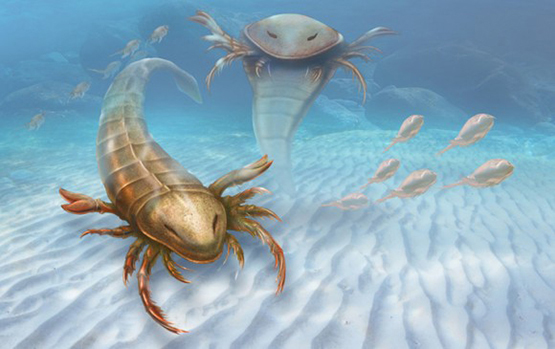
And there is always something interesting and unusual about the sea to report, such as the 467 million years old sea scorpion (above) found in a river in Iowa in the USA.
Click HERE to listen to the programme.





























































